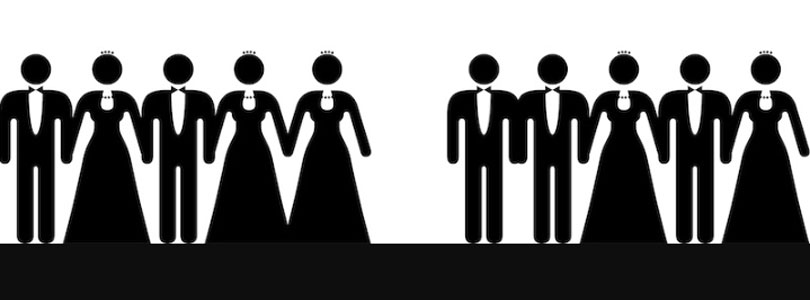RI General Assembly to Decide on Polygamy
A post on Sabin Tavern puts a spotlight on a pair of bills that look likely to get through the General Assembly this session, S2136/H7541. The state Senate has already passed it, and Democrat Speaker of the House Nicholas Mattiello (Cranston) is the second sponsor of the House version.
The benign title of the bills is “The Uniform Parentage Act,” but its effect will be anything but benign, and Rhode Island’s legislators need to know — and acknowledge — what it is they’re actually deciding when they vote on this act.
It falls into a category of legislation that politicians and commentators would prefer to let move along quietly. Some of them actively support what the bills are doing, while others simply don’t want to be caught up in the uncomfortable public debate they can start. Meanwhile, advocates for the bills are active and vocal, while advocates against them struggle to articulate what’s wrong with them.
This state of affairs is the fruit of years of battleground prep. Radicals have pressed our culture to discard tradition as a guide, denying that it amounts to the wisdom of ages passed down and deserving of some level of deference so we don’t unintentionally undermine our civilization. Therefore, tradition’s defenders find themselves struggling to articulate the reasons for things we’ve simply known to be true for generations. At the same time, the sheer intolerance of the radicals for disagreement imposes a high price for those who judge the winds incorrectly to be against radical change. They’ll experience auto-da-fé translated into social terms.
Start with the sentence in the legislation that most directly illustrates the radical change:
Consistent with the establishment of parentage under this chapter, a court may determine that a child has more than two (2) parents if the court finds that the failure to recognize more than two (2) parents would be detrimental to the child.
Supporters of the bills claim that it’s merely an “update” of the law to catch up to the reality of modern families. If that’s the case, the multiple-parent provision proves what the activists believe the modern family to be. They believe a child can have any number of parents of any variety of sexes. That isn’t just cleaning up loose ends from the last radical change; it pushes us precipitously toward the next one.
Think about it. This is simply the obvious, inevitable logic behind same-sex marriage (which traditionalists were savaged for pointing out when that was the radical change of the day). Same-sex marriage thoroughly eliminated the link between marriage and the the creation of children and therefore took biology out of the institution. If we deny that the law can recognize the unique quality of an intimate relationship between a man and a woman, how can that quality continue to carry weight for the product of such relationships? Put differently, if the possibility of procreation is not grounds for defining the familial relationship between adults, how can procreation continue to define the familial relationship between parent and child?
Next the radicals will run the same-sex marriage playbook in reverse. The Uniform Parentage Act also states that a person is “presumed to be a parent of a child” if he or she is married to the woman who gave birth to the child. (Although the law is so radical as to leave out the biological fact that only women can give birth.) Suppose a judge declares the biological father to be a third parent to the child, and the trio files a lawsuit to join him to the women’s marriage.
Suddenly, marriage and parenthood will be intrinsically linked again. It will be presented as the height of irrational bigotry to deny the child’s multiple parents the right to be married. After all, isn’t marriage all about children? If we can’t agree that a child can only have two parents, on what possible grounds will we say that an adult can only have one spouse?
To this day, nobody seriously disputes that the healthiest circumstance for children is to live in households with their two biological parents — a man and a woman providing lifelong stability within marriage. Indeed, middle-and-upper-class radicals continue to provide these circumstances for their own children because they know that it is best. Shouldn’t the laws of our land be able to reflect that as an ideal somehow?
Look, we live in a representative democracy. If you think the law of the land should permit polygamy, then fine, support that position, but be honest about it. Making the decision to define parents as whatever a judge can be convinced to declare inevitably makes the decision about polygamy, too, even if politicians and the public want to hide from it.
Another reality that activists and legislators should be honest enough to admit is that there is a political philosophy underlying this movement. Namely, progressives hold that everybody should get to do whatever they want sexually, and that government should, in turn, tax them and restrict their freedom in other ways in order to deal with the psychological and social consequences of a society that has discarded its moral guardrails.
If that’s your philosophy, at least have the courage to admit that you’re willing to go all the way. And if you’re not willing to go all the way, you don’t have a choice but to stop it now. Putting a bomb on a time delay doesn’t absolve you of the blame for the explosion.




